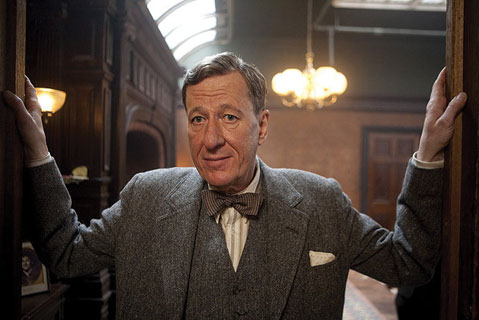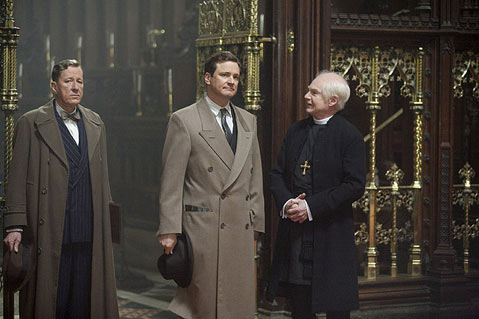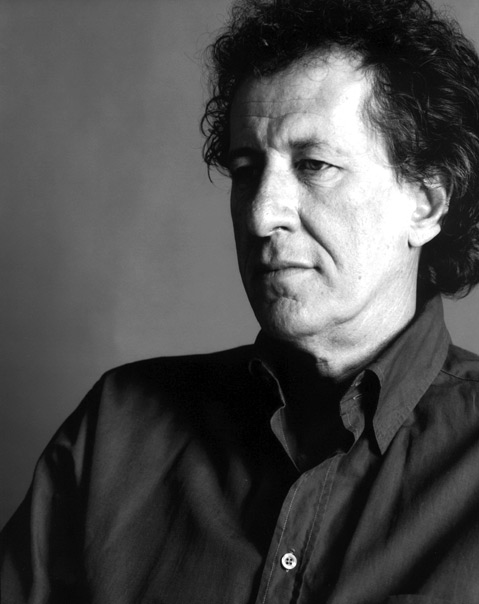Geoffrey Rush to Receive Montecito Award
Australian Actor Excels in The King’s Speech

The King’s Speech, which is based on the true story of how an Australian speech therapist named Lionel Logue helped George VI overcome a humiliating stutter in the nick of time to lead England into the Second World War, has become one of the most honored (and enjoyable) films of 2010. Colin Firth took home the Golden Globe for Best Actor in a Drama based on his portrayal of the king, but critics and viewers were equally enthralled by Geoffrey Rush’s Oscar-nominated performance as Logue, the unorthodox and superhumanly sympathetic failed actor who gets him through the ordeal. (So was the SBIFF crew, who just this week announced that the film’s cast would be honored with a first-ever ensemble-of-the-year award.) Rush, who is one of only 21 people to have earned the “Triple Crown” of acting — an Oscar, a Tony, and an Emmy — will be in Santa Barbara on Monday, January 31, to accept this year’s Montecito Award. I spoke with Rush by phone from Melbourne, where he was preparing for his next stage role, in Nikolai Gogol’s Diary of a Madman.
I understand that you were the one who found this property, is that correct? Yes, it is. A London-based fringe theater company had a copy of David Seidler’s playscript, and they passed it on to me. I was not in a position to accept a stage role in London at the time, but I was fascinated by Lionel Logue, the speech therapist. I loved the character, and I kept thinking about the script and how it might work.
How did the writer encounter the story? David Seidler was a stutterer himself, and being in his seventies now, he was about five when George VI made his great radio addresses, so the story had always been inspiring to him. Of course, the Australian connection was also a plus for me, especially as Logue was a relatively obscure figure.
Not any more. That’s true. Six months ago, you could have Googled “Lionel Logue” and pulled up next to nothing, but that’s all over now.

The film’s many beautiful wide-angle shots allow you and Colin Firth to be seen in full, from head to toe. Did you feel a strong connection with Tom Hooper in that regard during the filming? Yes, that’s true. Tom is an extraordinary collaborative director, and I was thrilled that the BAFTA Awards recognized the work he did to shepherd all the different creative departments around the camera and the design to do such a wonderful job. He’s a very searching, imaginative kind of director.
The sequences portraying the therapy sessions are quite amusing. Was that intentional? One challenge that we all felt we had to work hard at was getting the therapy sessions right. The scenes were each about 10 pages long, but they were not typical cinematic material. Tom Hooper’s idea about them was that they should show that, at the same time the wheels of history are turning for the royals, there’s this other drama going on. Because when the story begins, both Logue and Bertie are really nobodies. As the second brother, the Duke of York is looking forward to a quiet life of blending into the background, and he assumes that it will be his brother who will command the spotlight. He’s not expecting to make a mark on history, and he’s known historically as “the reluctant king” because he’s all right with that. But then fate steps in, and suddenly this man who still stammers at age 40 is thrown into the middle of things and has to make a go of it. History drags his country into six years of world war just as he comes to power, and his only ally in the personal struggle against his disability is this other nonentity, a failed actor from halfway around the world who’s not even British. The imperial/colonial gulf was something that we always wanted to keep in the story.
I love the line early on when Logue says to Bertie, “My castle, my rules.” It’s breathtakingly tough. Did you mean to play him that way? I had to walk a fine line in that scene, because I knew from the background reading I had done that Logue was capable of this amazing quality of pastoral care, but he was also quite aggressive, and I had to balance the two. On the one hand, Logue knew about diaphragmatic breathing and the technical side of speech problems, but then, through his work with victims of shell shock returning to Australia from the First World War, he discovered and developed his own personal strengths, which were predominantly intuitive and sympathetic.

Your portrayal of Logue’s discouraging audition for the Shakespeare play was funny and touching. Did that scene resonate with you? Oh, yes. You know we shot that on the very first day of filming, and it actually worked out to be an ideal introduction to the cast and crew because there I was, this Australian fellow standing up in front of a lot of English actors and doing my not-so-good version of Shakespeare, and it got quite a laugh. Later, when we were working to hone the material and there was some discussion of taking that scene out of the final cut, I lobbied for it with Tom Hooper because I felt that it was necessary to show the vulnerable side of Logue. He takes charge of Bertie, and he’s in control as a therapist, but you wouldn’t want the audience taking away the idea that what Logue does came easily to him or that he hadn’t struggled in life. To me that contradiction was important to retain.
The ensemble work with Logue’s wife and children is sharp. Did you work hard to get that wry tone? I attribute the success of all the subplots to Tom Hooper’s eye and to the great restraint he showed in regard to any trace of sentimentality. If you look at the exteriors, for instance, it is really a wintry and rather bleak version of England that he’s putting forward, and that approach to historical drama, which I knew he was capable of because I had seen John Adams, was crucial to the tone of the film.
Do you have any thoughts on the festival and the Montecito Award that you will be receiving? It’s a prestigious lineage. When I was informed of the award, I heard the names of some of the others [Annette Bening, Julianne Moore, Kate Winslet, Javier Bardem, Naomi Watts] who have received it in the past, and it was very gratifying.
4•1•1
Geoffrey Rush will receive the Montecito Award on Monday, January 31, at the Arlington Theater.



